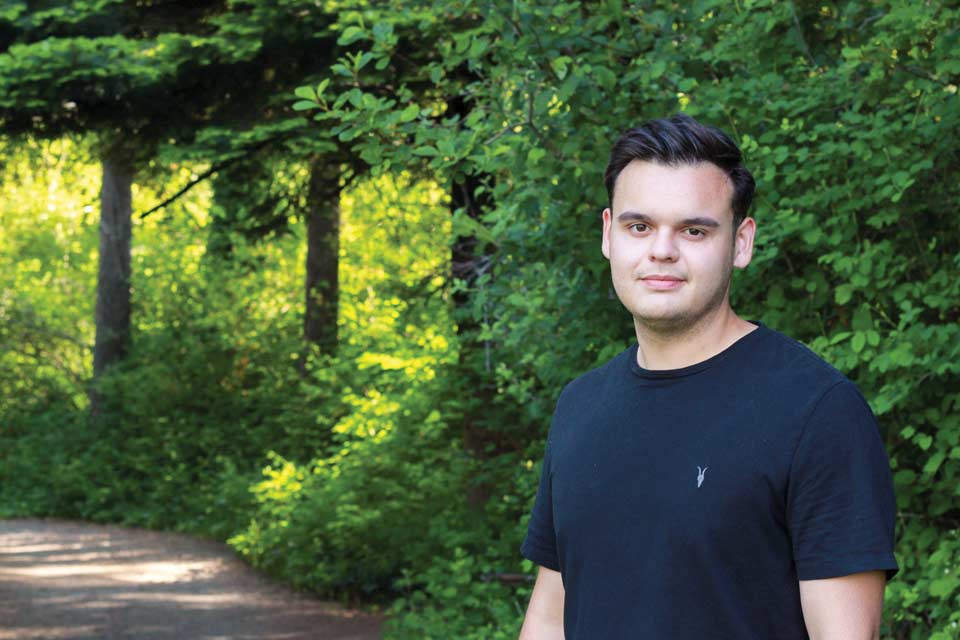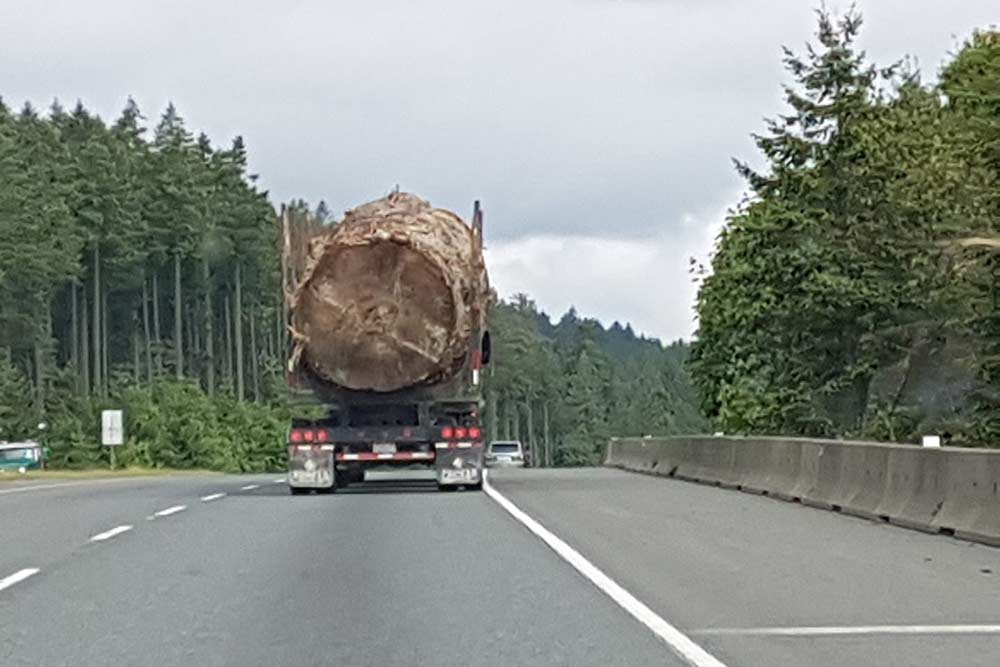Learning from lands and waters
- Philip Cox

Do rivers have rights? Grad’s research contributes to new land and water policy.
One of UVic’s newest graduates has combined his interests, research, heritage and thought-provoking perspectives on waterways to propose a promising new approach to resource management policy and law.
“Canadian law conceives of rivers solely in terms of ownership, jurisdictional rights and as resources to exploit, but many Indigenous Nations see them as animate beings, capable of mutual understanding, that connect past and future generations,” explains Andrew Ambers, who is Kwakwaka’wakw (‘Namgis and Ma’amtagila) and graduating from UVic this June with a bachelor’s degree in Indigenous studies and political science.
“I wondered: what would it mean to pair this Indigenous logic and reasoning with the Canadian legal concept of personhood, to rethink and reconfigure the status of rivers in Canada?”
This was the question that launched Ambers’ much-celebrated Jamie Cassels Undergraduate Research Award (JCURA) project, “The river’s legal personhood: A branch growing on Canada’s multi-juridical living tree,” which was subsequently published in UVic’s top undergraduate journal, The Arbutus Review.
His article has since been taken up by researchers developing land and water use policies in BC that account for the authority of Indigenous nations.
Though Ambers’ research is new, the problem he addresses is old. For generations, his family has contributed to efforts to stave off resource extraction and assert their inherent national rights and jurisdiction across their territories.
In a documentary produced during Indigenous-led protests against unsustainable logging practices in the 1980s, his grandfather, Ma’amtagila Hereditary Chief Basil Ambers, expresses concern about then-new clear-cutting techniques ravaging his peoples’ lands:
“It’s really sad. We are caretakers of this land. We hold it in trust for future generations. What we’re looking at is the greed of modern-day man, that is only interested in today. The Canadian government should recognize that they also have a duty to future generations of people. If we are going to leave a legacy—a legacy of stumps—for future generations, it’s them that are going to condemn the way we handled what the creator gave us to take care of.”

Decades later, these words may evoke viral images of felled ancient cedars and protest sites like Fairy Creek, which currently capture a significant amount of media attention. But Ambers notes that for his community at least, the roots of the issue reach far deeper than that, as people like his grandfather have long proclaimed.
The impact of forestry was devastating during my grandparents’ time, and that was back then. A lot has happened between then and now. But what they were fighting wasn’t simply about forestry—of course, it’s about the trees, but it’s also about rivers, about food systems, about governance and jurisdiction, and about the future. What they were fighting for was a lot bigger than what many people understood at the time.”
—UVic Indigenous studies and political science graduate Andrew Ambers
For the last four years, Ambers has prepared to carry on this work in his own way. His JCURA project, which was supervised by Abenaki historian Christine O’Bonsawin, invites law and policy makers to move away from thinking solely about governmental and corporate interests in rivers, which is the current status quo in BC.
“When we think of rivers and nature as persons, legal or otherwise, it shifts the orientation of our thinking. ‘Rights’ may not be the most ideal way to approach this, but it’s a language that most people can speak and understand,” he explains. “So the idea of extending rights to rivers helps people rethink what rivers are, which creates an opportunity to see them through the lens of Indigenous jurisdiction.”
The attempt to re-imagine the status of land and water is a theme that runs through much of Ambers’ work.
As a research assistant for Carey Newman (Hayalthkin’geme)—a multi-disciplinary Kwakwaka’wakw/Coast Salish artist, master carver and filmmaker, and the inaugural Impact Chair in Indigenous Art Practices with UVic’s Faculty of Fine Arts—Ambers is working on The Seedling Project, which seeks to reshape relationships with the land and honour intergenerational responsibilities to the land through art, governance, law and technology. The project is caring for a cedar tree sapling that will be carved into a totem pole once it reaches full maturity several centuries from now.
With Jeff Ganohalidoh Corntassel, a political scholar from the Cherokee nation and professor of Indigenous Studies, Ambers is also contributing to the Borders in Globalization research program. He helps to re-envision Western conceptions of borders and international relations through coastal, Indigenous perspectives—a topic he can speak to as a coastal citizen studying histories of the Pacific Northwest and which he will experience first-hand this summer as a participant in Tribal Journeys.
In the fall, Ambers will begin UVic’s world-first joint degree program in Canadian common law and Indigenous legal orders, with intent to focus on ocean-based practices, laws and knowledges. This was a subject area he explored in his honours thesis—nominated as one of the best in the province by the BC Political Science Association—and as a research assistant for Kanaka Maoli scholar Lisa Kealohapaʻaokahaleole Hall, director of Indigenous Studies and 2023 UVic President’s Chair.
“I think the oceans will be an increasingly important area of interest in the near future, which is why we need to articulate Indigenous ocean-based perspectives and analytical frameworks now,” Ambers says. “By 2030, the UN seeks to implement a Universal Declaration of Ocean Rights. The question of Indigenous law in these developments is looming, so research on how Indigenous nations articulate, relate to and engage with oceans will be impactful for decades to come.”
For now, Ambers will spend the summer travelling with friends and continuing land-based work on an Indigenous and lək̓ʷəŋən-led project that reinvigorates native ecosystems and teaches university and grade school classes about the social and ecological significance of certain native plants.
It’s everyday acts of resurgence like these, Ambers says, that link the work of today with that of past and future generations, which grounds his daily practice.
“We do our part now and hopefully the people who follow us will do their part. The point is to do good work now and continue the work of those who may no longer be here or can no longer do so. Resurgence is happening all the time, in many different ways—through art, through culture, through politics, through law—even if it’s not seen as such, or really outward facing. So, I’m generally optimistic about the future. If I wasn’t, what’s there to work for?”
Andrew has been an active, valued member of the UVic community over the last few years. He has made a number of important contributions to the Indigenous Studies and political science programs, and to the university more broadly. He has a strong passion for law and justice, inspired by family members who have devoted their lives to practicing Kwakwaka’wakw ways of living and upholding the laws and ethics of the Kwakwaka’wakw Nation. We are excited and proud to see what he will achieve in the next stage of his academic career and beyond.”
—UVic history and Indigenous Studies professor Christine O’Bonsawin (Abenaki Nation)


